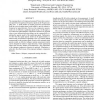Free Online Productivity Tools
i2Speak
i2Symbol
i2OCR
iTex2Img
iWeb2Print
iWeb2Shot
i2Type
iPdf2Split
iPdf2Merge
i2Bopomofo
i2Arabic
i2Style
i2Image
i2PDF
iLatex2Rtf
Sci2ools
115
click to vote
ICASSP
2008
IEEE
2008
IEEE
Subspace compressive detection for sparse signals
The emerging theory of compressed sensing (CS) provides a universal signal detection approach for sparse signals at sub-Nyquist sampling rates. A small number of random projection measurements from the received analog signal would suffice to provide salient information for signal detection. However, the compressive measurements are not efficient at gathering signal energy. In this paper, a set of detectors called subspace compressive detectors are proposed where a more efficient detection scheme can be constructed by exploiting the sparsity model of the underlying signal. Furthermore, we show that the signal sparsity model can be approximately estimated using reconstruction algorithms with very limited random measurements on the training signals. Based on the estimated signal sparsity model, an effective subspace random measurement matrix can be designed for unknown signal detection, which significantly reduces the necessary number of measurements. The performance of the subspace ...
ICASSP 2008 | Signal Detection | Signal Processing | Signal Sparsity Model | Subspace Compressive Detectors |
Related Content
| Added | 30 May 2010 |
| Updated | 30 May 2010 |
| Type | Conference |
| Year | 2008 |
| Where | ICASSP |
| Authors | Zhongmin Wang, Gonzalo R. Arce, Brian M. Sadler |
Comments (0)

